Trump policies threaten University of Hawaii ethnic studies programs
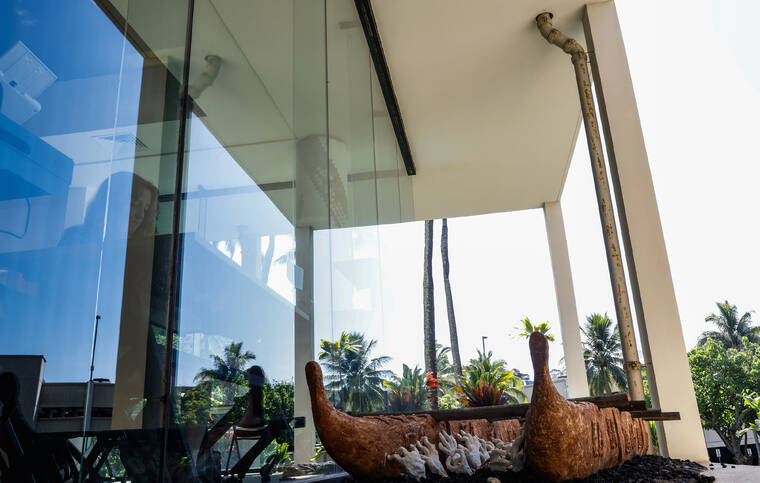
JAMM AQUINO / JAQUINO@STARADVERTISER.COM
A replica of a double hulled canoe is seen outside the student resource center at UH Manoa’s Kamakakuokalani Center for Hawaiian Studies.
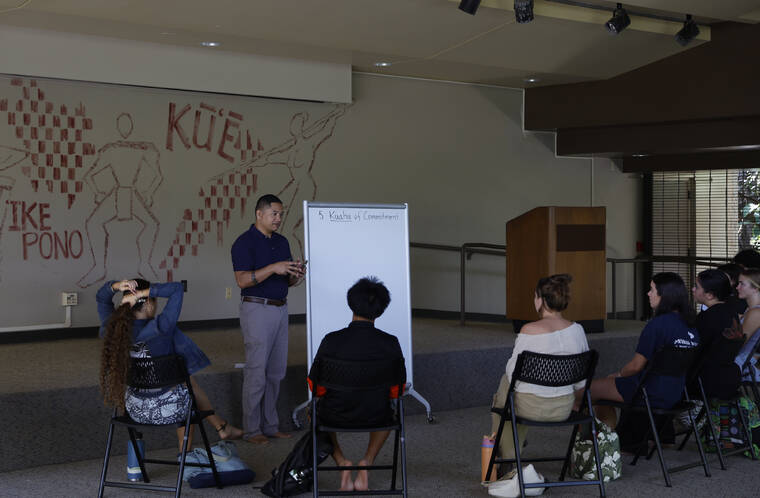
JAMM AQUINO / JAQUINO@STARADVERTISER.COM
Kumu Keoki Baclayon, back, teaches laau lapaau, a Hawaiian healing arts class on Thursday.
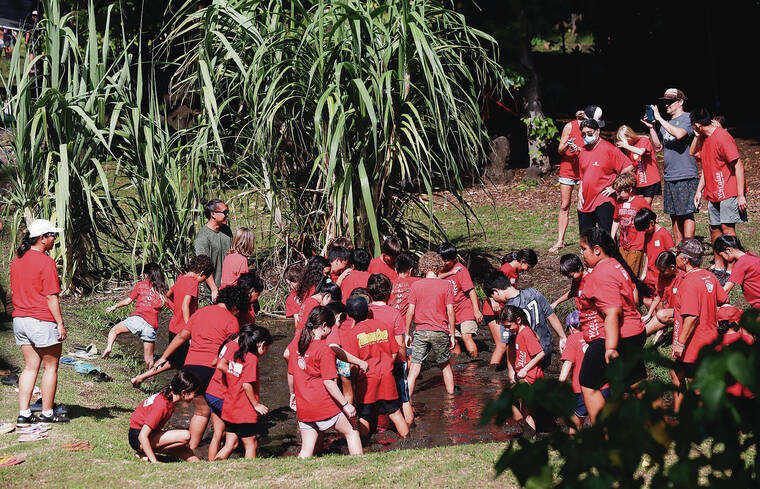
JAMM AQUINO / JAQUINO@STARADVERTISER.COM
Keiki entered the loi kalo at UH’s Kamakakuokalani Center for Hawaiian Studies.
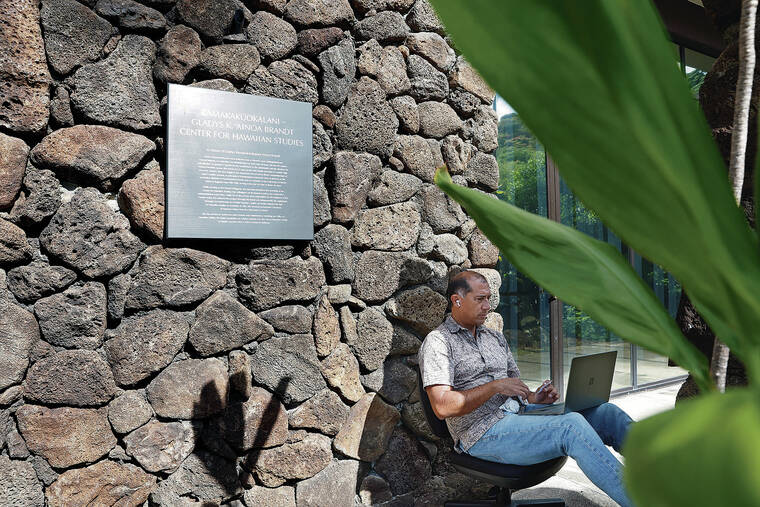
JAMM AQUINO / JAQUINO@STARADVERTISER.COM
Associate professor Kawika Winter attended a Zoom meeting on his laptop on Thursday. Winter teaches Hawaiian ecosystems at UH’s Hawai‘inuiakea School of Hawaiian Knowledge.
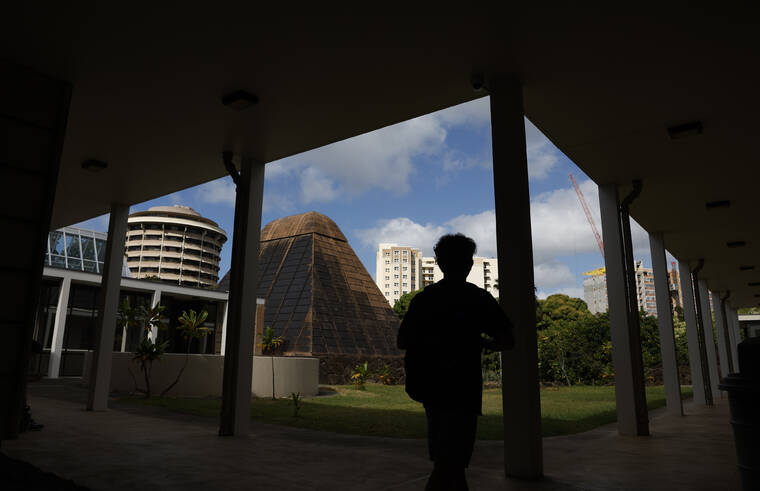
JAMM AQUINO / JAQUINO@STARADVERTISER.COM
A student is silhouetted against the campus buildings at UH Manoa’s Kamakakuokalani Center for Hawaiian Studies.
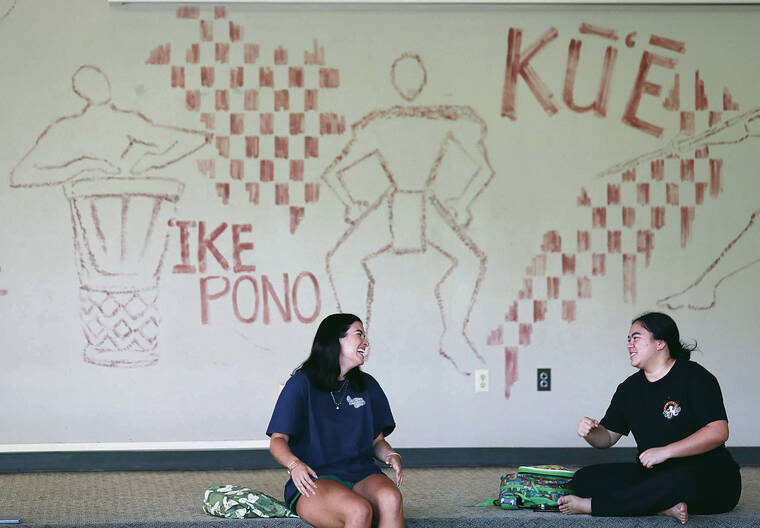
JAMM AQUINO / JAQUINO@STARADVERTISER.COM
Hawaiian studies majors Sophia Antonios, left, and Savannah Kupuka‘a shared a laugh on Thursday before class at UH Manoa’s Kamakakuokalani Center for Hawaiian Studies. They were attending a laau lapaau class on Hawaiian medicinal herbs taught by Keoki Baclayon.






President Donald Trump’s order banning diversity, equity, inclusion and accessibility programs has University of Hawaii students and faculty worrying about the future of academic programs that focus on Hawaiian, Filipino, Korean and other ethnic cultures.
“We don’t know what this means for the university,” said Jonathan Kay Kamakawiwo‘ole Osorio, dean of UH’s Hawai‘inuiakea School of Hawaiian Knowledge. “We’re not different from any other government agency that employs people, or even businesses, here. I am certain these conversations are taking place everywhere.”
Other UH professors who teach courses that address Hawaiian culture and history said the assault on so-called DEIA programs by the Trump administration represents just the latest chapter in Hawaii’s long history of colonialism that they say Hawaiians will once again endure and overcome.
But all people of color are under attack, according to UH professor Marie Alohalani Brown, who teaches Hawaiian and Polynesian religions.
“Everyone is at risk if you’re not Protestant and white,” she said.
For Native Hawaiians, in particular, “There’s a long history of U.S. persecution of the Hawaiian people,” Brown said.
Don't miss out on what's happening!
Stay in touch with breaking news, as it happens, conveniently in your email inbox. It's FREE!
Brown, who’s Hawaiian, was one of the first four of 38 kupuna arrested in 2019 while protesting the planned construction of the Thirty Meter Telescope atop Mauna Kea and later found not guilty of obstructing the mountain’s access road.
With Trump in the White House, Brown said, “I am aware that there’s a possibility that we could be persecuted down the line in our department. … But I am not going to stop being who I am and teaching about Hawaiian religion from the perspective of the Hawaiian ways. I am willing to put my life on the line for peaceful protest.”
Ethnic studies at risk
Trump’s attack on diversity, equity, inclusion and accessibility places a target directly on UH, according to political analyst Neal Milner.
“The university’s mission statement talks about an Asia and Pacific focus and this school prides itself on its ethnic studies programs,” he said. “And the Hawaiian studies program is unique.”
“This is real,” Milner said. “This gets down to the flesh and blood and bones of friends and relatives.”
UH senior Pohakea Wilson, 21, grew up in Kaneohe with little awareness or knowledge of his Hawaiian heritage, culture and history. He plans to graduate with a degree in finance management but has been taking classes at the Hawai‘inuiakea School of Hawaiian Knowledge to fulfill a UH culture requirement.
The classes have been an awakening for Wilson.
“I didn’t know much, not too much about Hawaiian culture,” he said while waiting for his class on the healing properties of indigenous plants to begin. “I was oblivious.”
Now, Wilson regularly goes home and tells his parents about what he’s learned about their shared culture and history.
So Wilson joins others at UH who worry that Trump’s DEIA ban could limit — or possibly even shutter — programs focused on specific ethnicities, like Hawaiian.
If so, he said, “It would be a tragic loss.”
Trump’s purge of DEIA programs, language and policies also could affect a wide range of student clubs and organizations at UH-Manoa that include the Filipino Law Students group, Micronesian Wayfinders Club, the Gender Equity Movement, Timpuyog for Ilokano Language and Literature Program, Black Student Association, Ethnic Studies Student Association and Latinxs Unidxs, which describes itself as “a group of students who are descended from the peoples and diverse cultures originating from the Americas.”
There’s also the “Kpop Cardio Crew” that exercises to K-pop music.
Exemptions unclear
In her latest update to the 10-campus UH system about Trump administration directives last week, UH President Wendy Hensel said the initial prohibition on DEIA programs was followed by two directives from the U.S. Department of Education that still leave room for interpretation.
Hensel wrote, “On January 31, 2025, the President issued Executive Order 14173 titled ‘Ending Illegal Discrimination and Restoring Merit-Based Opportunity.’ The directive states that DEIA programs can violate civil rights laws and directs all grant recipients, including universities, to end unlawful ‘preferences, mandates, policies, programs and activities.’ The EO requires universities, as a condition of receiving federal funding, to certify that they do not operate any programs promoting DEIA. Consequences for false assertions are not only the loss of federal funding, including financial aid for students, but potentially civil and criminal penalties for the university’s certifying official.”
The U.S. DOE offered subsequent guidance that “states categorically that ‘if an educational institution treats a person of one race differently than it treats another person because of that person’s race, the educational institution violates the law.’ It prohibits universities from using race ‘in decisions pertaining to admissions, hiring, promotion, compensation, financial aid, scholarships, prizes, administrative support, discipline, housing, graduation ceremonies, and all other aspects of student, academic, and campus life.’”
A subsequent DOE directive, Hensel said, “stated more clearly that universities may ‘no longer operate programs based on race.’”
One Trump executive order makes exceptions for universities that work to protect First Amendment rights of free speech and prevent illegal employment.
“While the meaning and extent of these exemptions are unclear, they suggest that academic programs and curricula currently may fall outside the order,” Hensel said.
Osorio provided the Honolulu Star-Advertiser with a statement that began by recounting U.S. military support for “an insurgency led by Americans and Europeans against our Queen and our government, despite numerous treaties and an unbroken history of friendship and trade. … Hawaiians have resisted and have successfully reclaimed our language, heritage and nationhood and we will continue to do this.
“The US government has dispossessed and devastated other nations on the American continent and in the Pacific, but now that government actually intimidates and abuses its own citizens and Americans will have to decide whether they will stand up for themselves or not,” Osorio wrote.
Brown’s prepared to join the latest fight against an assault on Hawaii values.
“There’s been more than one (Hawaii cultural) renaissance,” she said. “It’s been a continuum. For those of us who can access Hawaiian newspapers from back in time, we can see the depth and breadth of this arc.”
Diverse population
On his first day back in the Oval Office in January, Trump began threatening to cut off the flow of federal dollars to universities like UH, Hawaii’s nonprofit organizations and other state agencies and departments and fire anyone who resists, including those who refuse to take down posters and signs that talk about diversity, equity, inclusion and accessibility.
Hawaii remains one of the country’s most diverse states with no dominant ethnic majority, and UH academic programs have a rich history looking at modern and historical events in Hawaii through a cultural lens.
It began with the first waves of Japanese and Filipino immigrants in the late 1800s and early 1900s who arrived to work on Hawaii’s agricultural plantations. They were followed by subsequent groups of immigrants from around the world.
Assistant professor Kawika Winter primarily works as a research scientist at the Hawai‘i Institute of Marine Biology at Coconut Island in Kaneohe Bay but also teaches Hawaiian ecosystems at UH’s Hawai‘inuiakea School of Hawaiian Knowledge.
All the worry about the fallout from Trump’s early days on both the scientific and Hawaii studies sides of Winter’s work at UH “is taking up quite a lot of our bandwidth,” he said. “Along with our own anxiety that it brings into our minds, it’s having a major impact.”
Ethnic studies students, especially, worry “because of some of the culture wars that are happening in the federal government,” Winter said.
At the same time, he said, “there are lots of folks in this university who are going to figure out how to do it. We know what it takes to make it through tough times.”



